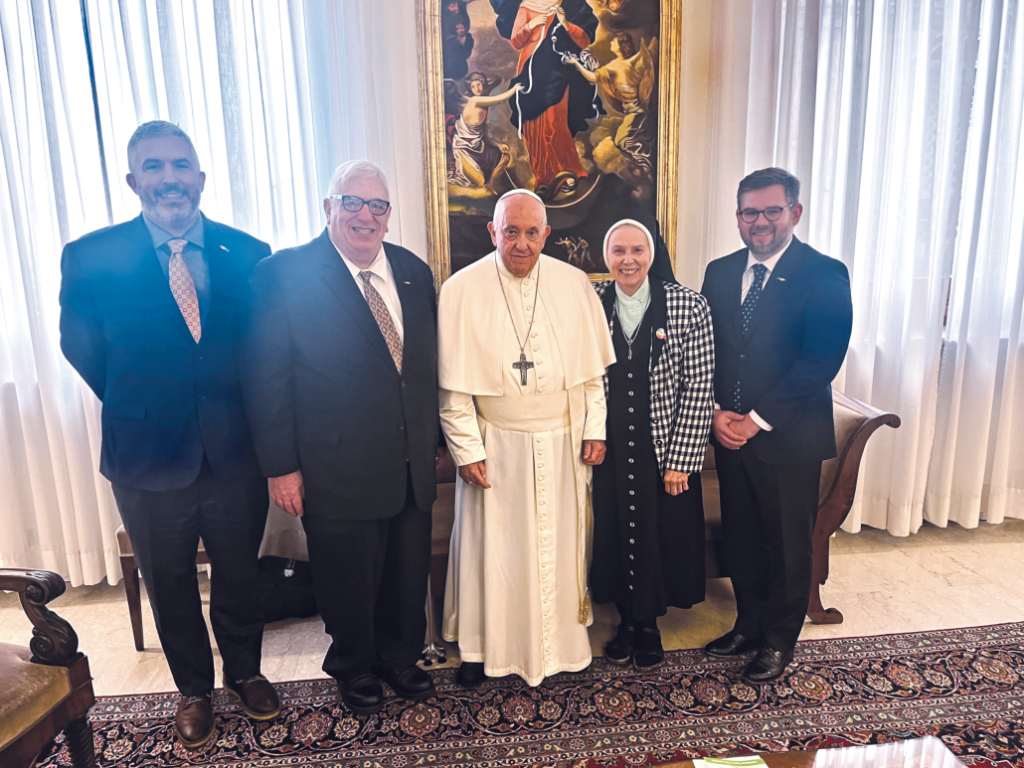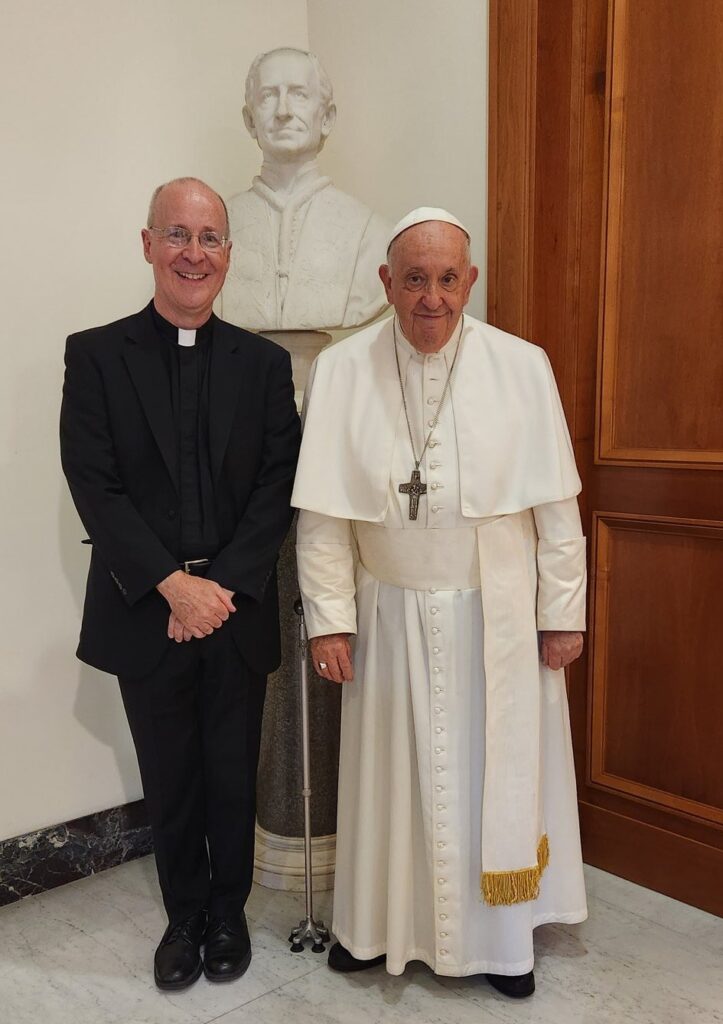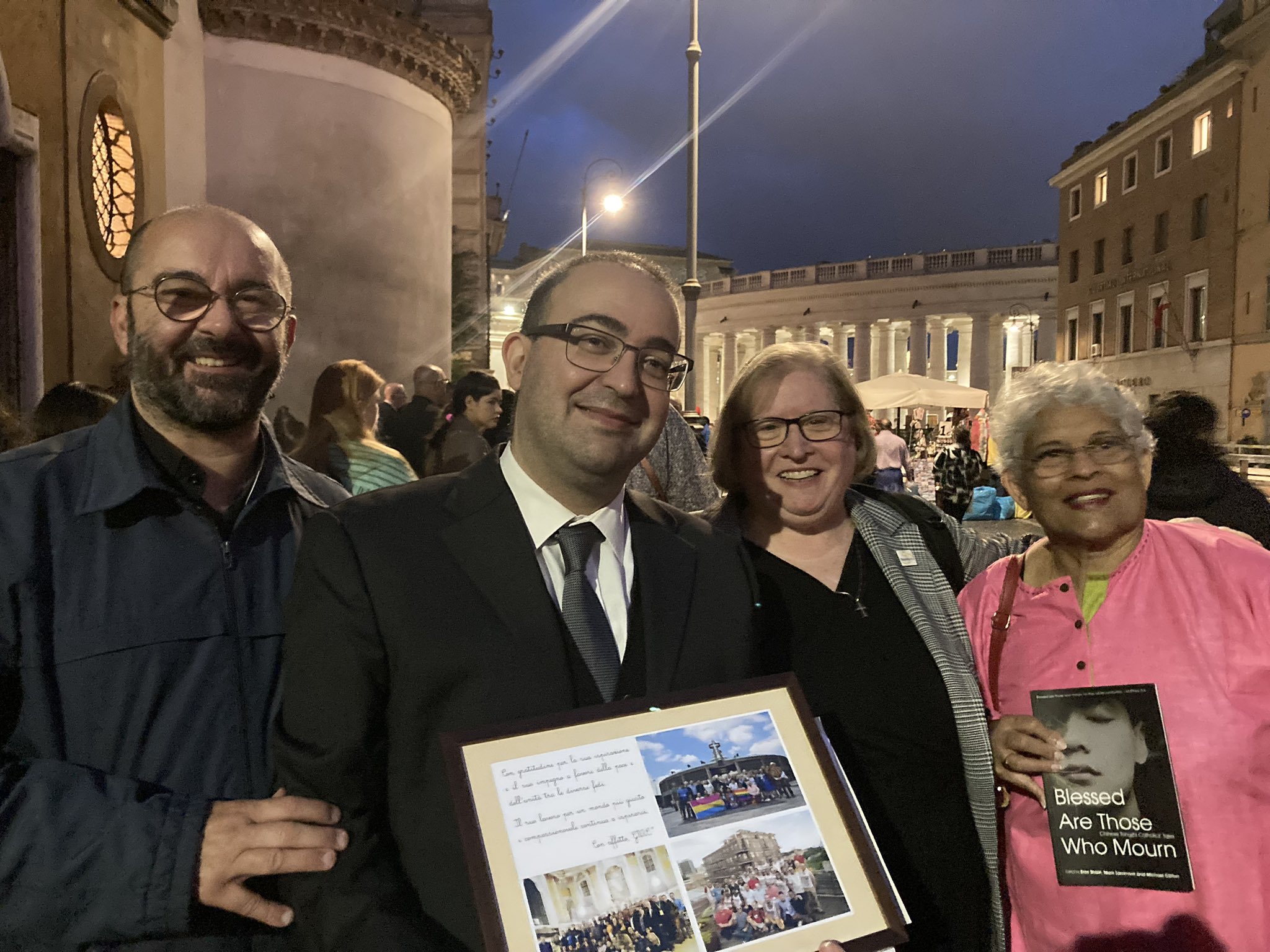In a series of significant Vatican meetings throughout and immediately before October, while the Synod on Synodality gathered for its first universal session, Pope Francis demonstrated public support for representatives of several LGBTQ Catholic organizations.
In the span of a few weeks, the pope has met with Outreach editor James Martin, S.J., Sister Jeannine Gramick, S.L., of New Ways Ministry and Marianne Duddy-Burke, the co-chair of the Global Network of Rainbow Catholics and executive director of DignityUSA—all well-known advocates for LGBTQ Catholics whose groups have historically faced criticism and public backlash for their work.
On October 25, Pope Francis met with Duddy-Burke and several representatives of the Global Network of Rainbow Catholics (G.N.R.C.) at the Vatican. Founded in Rome in 2015, the G.N.R.C. brings together LGBTQ Catholic advocates from various countries and opposes discrimination in the church and civil society. “Any law or practice which oppresses, restricts, punishes or harms LGBTI persons is contrary to the Gospel,” reads part of their mission statement.
On October 25, Pope Francis met with Duddy-Burke and several representatives of the Global Network of Rainbow Catholics (G.N.R.C.) at the Vatican.
Also notable is Duddy-Burke’s four-decade association with DignityUSA, which during the height of the H.I.V./AIDS crisis in New York, saw priests banned from celebrating Mass for members and groups expelled from city parishes. Patrick X. Nidorf, O.S.A., the late Catholic priest who founded Dignity in San Diego in 1969, was prohibited from LGBTQ ministry by the then-archbishop of Los Angeles in 1971.
We were able to thank the pope for his groundbreaking statement that the criminalization of people based on our identities must end,” wrote Duddy-Burke in a statement. “We urged him to direct bishops and Catholic political leaders to act on his statement by opposing the criminalization of LGBTQIA+ people rather than actively supporting it, as some have recently done.”
But perhaps most surprising is Pope Francis’s welcome of New Ways Ministry, a long standing LGBTQ Catholic group that has experienced a complicated and at times acrimonious relationship with church officials.
In 1999, Sister Jeannine Gramick, who met with Pope Francis on October 17, was ordered by the Vatican to cease her ministry to LGBTQ Catholics. Cardinal Joseph Ratzinger, later Pope Benedict XVI, issued a public directive stating that Sister Gramick and Rev. Robert Nugent, who co-founded New Ways Ministry in 1977, were “permanently prohibited from any pastoral work involving homosexual persons.”

Eventually, she switched religious orders and resumed her LGBTQ ministry. “I realized I felt like a battered woman,” she told America in 2022.
But in 2021, Pope Francis penned one of several letters to Sister Gramick in which he lauded her decades-long work with LGBTQ people. “Thank you, Sister Jeannine, for all your closeness, compassion and tenderness,” wrote the pope, also referring to her as a “valiant woman.” Speaking with the National Catholic Reporter last week, Sister Gramick called Pope Francis a friend and a “man of God” who continually looks ahead.
“I think Pope Francis is trying to get us to move forward, to open our eyes and look to the future and to changes in the world,” she said. The pope’s in-person meeting with Sister Gramick and New Ways representatives this month marks another stunning turn in Francis’s efforts to rehabilitate the Catholic sister as a model of pastoral ministry.
Father Martin joined several U.S. prelates as a Synod participant this month and met with Pope Francis at the Casa Santa Marta, the pontiff’s residence, one day before the consistory in late September. (Pope Francis, who has written several letters to Outreach, first met with Father Martin at the Vatican in September 2019.) “I was honored to spend time with the Holy Father before the Synod began,” wrote Father Martin in a message to Outreach. “We had a wide-ranging discussion and I once again felt encouraged as a Jesuit in my ministry with LGBTQ Catholics.”

In addition to these October meetings, Pope Francis sent an encouraging note this month to Stan “J.R.” Zerkowski, the executive director of Fortunate Families, a Kentucky-based group for families with LGBTQ members. (Zerkowski also works with LGBTQ Catholics in the Diocese of Lexington, Ky., with Bishop John Stowe, who spoke at the Outreach conference in 2022.)
These papal meetings come amid widespread speculation and significant interest about discussions between Synod delegates on LGBTQ topics. According to the National Catholic Reporter, several international Synod delegates have spoken about LGBTQ people in the church, with some urging greater inclusion and others expressing concerns about such efforts. Timothy Radcliffe, O.P., who led delegates on a three-day retreat in early October, revealed that participants wept at the story of a bisexual woman who died by suicide after feeling unwelcomed by the church.
These papal meetings come amid widespread speculation and significant interest about discussions between Synod delegates on LGBTQ topics.
David Palmieri, a contributing writer for Outreach, has noted that even the Synod preparatory documents showed a shift towards recognition for gay Catholics by using the term “LGBTQ+” in its pages. “Using this abbreviation is historic because the church has long persisted in an argument against these letters and their variations, at times denying that LGBTQ people, described as such, even exist,” he wrote.
But some church leaders and Synod observers remain cautious about expecting change or reform from the Synod on LGBTQ topics. In July, now-Cardinal Christopher Pierre, the U.S. papal nuncio, sought to dissuade Catholics from viewing the Synod as an opportunity to overhaul church teaching on a variety of topics. “[The Synod] is not to change the doctrine of the church,” he told OSV News. “A lot of people are afraid about synodality. They say, ‘The pope will change everything.’ No, that’s not true.”
Updated October 25, 1:11 p.m.



